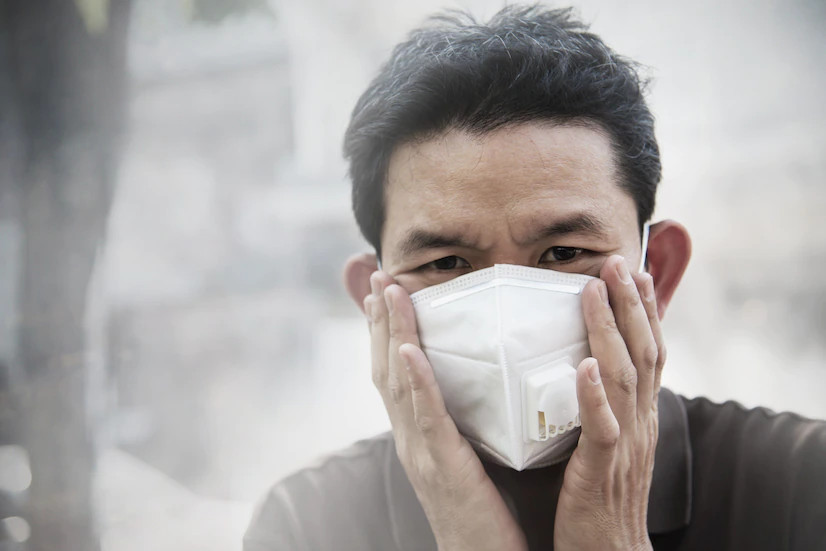Lung cancer comes from the uncontrolled growth of cells in the lungs. Typically, the process of cell division and death occurs regularly. However, the normal functioning of this process becomes disrupted in the event of cancer. The cancer cells will keep growing and then divide uncontrollably.
Lung cancer complications
Lung cancer can lead to a number of complications, such as:
Difficulty breathing
Blockage of the airways can result from the growth of cancer in the lungs. This cancer has the potential to induce inflammation in the respiratory system and put pressure on the airways. As a result, you may experience shortness of breath.
The recommended actions for relieving difficulty breathing are to stop smoking, limit exposure to cigarette smoke, consume adequate water, practice breathing exercises, and get enough sleep.
Coughing blood
Hemoptysis, or coughing blood, is one of the complications associated with lung cancer. Frequently, a bronchoscopy or other endoscopic procedure will be required to identify and stop the source of bleeding in the respiratory tract.
It is common practice to apply radiotherapy to manage bleeding, reduce the tumor, and slow its progression to control bleeding.
Chest pain
As the tumor expands within the lungs, it puts pressure on the nerves, resulting in chest pain and decreased breathing capacity. The pain increases when you inhale deeply or do specific activities that impact the lungs.
As the tumor size increases, the risk of the tumor pressing on the surrounding structures and tissue in the lung also increases. The doctor would typically assess the severity of the symptoms and decide on a suitable therapy plan to manage both the pain and the cancer.
Read more: Men Can Also Get Breast Cancer, These Are The Symptoms
Pleural effusion
Pleural effusion is the accumulation of fluid in the pleural space, which is the space between the layers of the pleura that line the inner chest wall. Pleural effusion can be a severe complication for those with lung cancer. The lungs cannot completely expand when excessive fluid accumulates, resulting in discomfort and shortness of breath.
For this purpose, the doctor will need to use a needle to drain the excess fluid accumulated in the chest cavity. This can help reduce pressure in the lungs, relieve shortness of breath, and reduce the risk of further complications.
Pericardial effusion
Tumor growth in the chest or near the heart may disrupt the heart's function and induce pericardial effusion. A pericardial effusion is a fluid accumulation in the sac that covers the heart (pericardium).
This condition disrupts heart function, resulting in abnormal heart rhythms and difficulty pumping blood. In certain cases, the doctor must perform a chest incision to help remove fluid from the pericardial sac.
Read more: Causes Of People With Lung Cancer Reject Treatment
Blood coagulation
Thrombocytosis, an elevation in platelet count in the blood, is commonly observed in several types of cancer, such as lung cancer. The condition may increase the risk of blood clots that eventually release and travel to vital organs, including the brain or heart.
Metastasis
Through a process known as metastasis, lung cancer can spread to several tissues and organs throughout the body. This requires treatment to relieve symptoms, minimize tumor growth, and enhance quality of life.
Typically, lung cancer is non-treatable once it has progressed to the metastatic stage. Nevertheless, medical treatments, including chemotherapy, radiotherapy, immunotherapy, and other therapies, can still be given to patients to improve their quality of life and relieve discomfort.
If you are experiencing symptoms that are indicative of lung cancer, including persistent coughing, shortness of breath, or blood in the sputum, you can either visit a doctor or make use of the consultation features that are available in the Ai Care application by downloading the Ai Care application from the App Store or Play Store.
Looking for more information about other diseases? Click here!
- dr. Alvidiani Agustina Damanik
American Cancer Society (2023). What Is Lung Cancer?. Available from: https://www.cancer.org/cancer/types/lung-cancer/about/what-is.html
Mayo Clinic (2022). Lung cancer. Available from: https://www.mayoclinic.org/diseases-conditions/lung-cancer/symptoms-causes/syc-20374620
Shishira Sreenivas (2023). Lung Cancer Complications. Available from: https://www.webmd.com/lung-cancer/lung-cancer-complications
John Hopkins Medicine. Manage Shortness of Breath with Lung Cancer. Available from: https://www.hopkinsmedicine.org/health/conditions-and-diseases/lung-cancer/manage-shortness-of-breath-with-lung-cancer
Julie Scott, MSN, ANP-BC, AOCNP (2022). Lung Cancer and Coughing Up Blood: When to See a Healthcare Provider. Available from: https://www.verywellhealth.com/lung-cancer-and-hemoptysis-5212804
Cleveland Clinic (2022). Coughing Up Blood. Available from: https://my.clevelandclinic.org/health/symptoms/17696-coughing-up-blood
Mathieu Rees (2023). What causes chest pain when you have lung cancer?. Available from: https://www.medicalnewstoday.com/articles/chest-pain-from-lung-cancer
Matthew Hoffman, MD (2023). What Is a Pleural Effusion?. Available from: https://www.webmd.com/lung/pleural-effusion-symptoms-causes-treatments
Cedars Sinai (2022). Pericardial Effusion. Available from: https://www.cedars-sinai.org/health-library/diseases-and-conditions/p/pericardial-effusion.html











